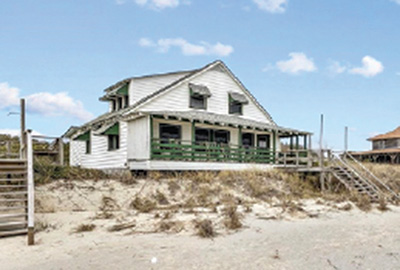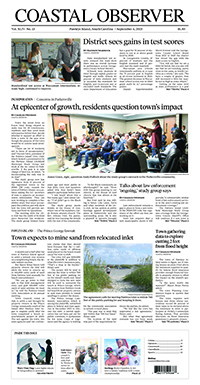Pawleys Island
Town shifts historic home protection to fast track

Owners of nine structures listed on the National Register of Historic Places are being polled by Pawleys Island officials to gauge support for restrictions that would prevent the demolition of those buildings. The town Planning Commission wants to present Town Council with a draft ordinance next month.
“We’ve just got to preserve our history,” said John Hildreth, who chairs the commission.
The commission has discussed historic preservation since the town adopted architectural guidelines for new houses in 2021. After the town added tree protection to the guidelines last year, the commission prepared an ordinance to protect the nine National Register properties.
Town Council members said the commission should look at incentives rather than regulations.
The issue resurfaced last month when the town received a request for a variance from the owners of one of those houses, Liberty Lodge, who want to renovate the 19th century structure, but tear down a 1940s house on the same lot. The newer house is too costly to renovate, they said.
The owners, Brian and Staci Inskeep, want to build a new beach house, but need a variance that allows two houses on a single lot or that allows two lots that don’t meet the town’s unified development code.
There is concern that Liberty Lodge could be torn down if a variance is not granted, said commission member John LaMaster.
Hildreth said he doesn’t want to see the 1940 house, known as Port Arthur, demolished.
“What is Pawleys Island? Go down and look at Port Arthur,” he said.
Hildreth and other commission members looked at preservation ordinances in Charleston and Georgetown. Options included creating a historic district where demolition would be subject to review or protecting structures based on their age.
“The problem is we don’t have a reliable inventory like Charleston has,” LaMaster said.
A 100-year limit wouldn’t affect a property like Port Arthur, but a 50-year limit would cover structures that may not be significant, he added.
But the town could add demolition to the purview of the Architectural Review Board. That now includes new houses and trees. It does not include additions or renovations.
“That’s the easiest thing, to expand the ARB’s remit,” LaMaster said.
“Not having demolition is a little scary,” commission member Fran Green said.
The board could consider whether a house has “the Pawleys look” before it gives permission to tear it down, Hildreth said.
But commission member Mark Hawn said the town needs to balance the character of its houses with the rights of its property owners.
“There’s a humongous difference between governing money people are getting ready to spend and money they’ve already spent,” Hawn said.
He suggested the town revisit the nine Historic Register properties and survey the owners about their willingness to accept restrictions.
The owners were surveyed once before. All but one agreed to limits on demolition.
Hawn spoke with those owners, whom he did not name, and said they didn’t want to do anything that would restrict the value of the property because they planned to sell it.
He offered to speak with them again.
“We’re kicking the can down the road,” commission member Buddy Keller said.
Green pointed out that historic preservation hadn’t restricted property values in Charleston.
“We don’t need to check their temperature, we need to do this,” she said.
But the commission agreed to contact the owners of the National Register properties again.
LaMaster asked if they were prepared to leave out one of the nine.
That’s something they can discuss after speaking with them all, Hawn said.
“I think we get 95 percent of the way there with opt-in,” he said. “I’m hearing from the community: be careful about regulation.”
The commission will schedule a special meeting after talking with the owners and present a recommendation to Town Council in May.
A hearing on the Liberty Lodge variance was held Thursday. The Board of Zoning Appeals approved a variance that will allow the Inskeeps to demolish Port Arthur and rebuild a new home in exchange for agreeing to preserve Liberty Lodge in perpetuity. The footprint of the new home can be no more than 50 percent larger of the current structure.
Update: This story was updated from the print version to include the outcome of the zoning appeal.




